鲁科版四年级英语上册语法汇总
- 格式:doc
- 大小:28.50 KB
- 文档页数:2
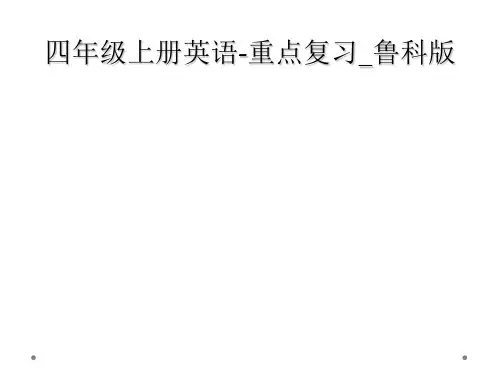
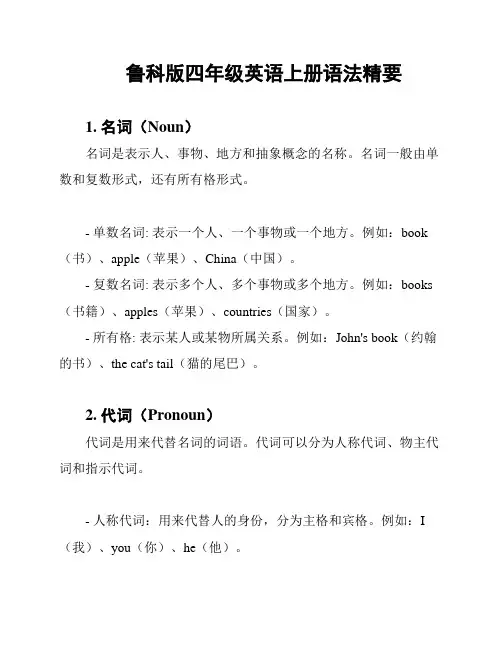
鲁科版四年级英语上册语法精要1. 名词(Noun)名词是表示人、事物、地方和抽象概念的名称。
名词一般由单数和复数形式,还有所有格形式。
- 单数名词: 表示一个人、一个事物或一个地方。
例如:book (书)、apple(苹果)、China(中国)。
- 复数名词: 表示多个人、多个事物或多个地方。
例如:books (书籍)、apples(苹果)、countries(国家)。
- 所有格: 表示某人或某物所属关系。
例如:John's book(约翰的书)、the cat's tail(猫的尾巴)。
2. 代词(Pronoun)代词是用来代替名词的词语。
代词可以分为人称代词、物主代词和指示代词。
- 人称代词:用来代替人的身份,分为主格和宾格。
例如:I (我)、you(你)、he(他)。
- 物主代词:用来代替所属关系,分为形容词性和名词性。
例如:my(我的)、your(你的)、his(他的)。
- 指示代词:用来指示人或物的位置。
例如:this(这个)、that(那个)、these(这些)、those(那些)。
3. 动词(Verb)动词是表示行为、状态或出现的词语。
动词的时态包括现在时、过去时和将来时。
- 现在时:表示现在正在进行的动作。
例如:I eat an apple.(我正在吃一个苹果。
)- 过去时:表示过去发生的动作。
例如:I ate an apple.(我吃了一个苹果。
)- 将来时:表示将来要发生的动作。
例如:I will eat an apple tomorrow.(明天我将吃一个苹果。
)4. 形容词(Adjective)形容词用来描述名词的特征或性质。
形容词一般放在名词前面。
- 例句:- A big book(一个大书)- The beautiful flower(美丽的花)5. 副词(Adverb)副词用来描述动词、形容词或其他副词的程度、方式或时间。
- 例句:- He runs fast.(他跑得快。
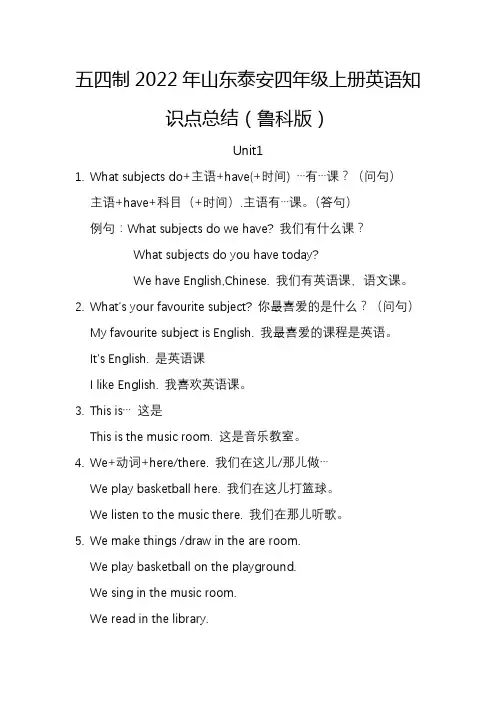
五四制2022年山东泰安四年级上册英语知识点总结(鲁科版)Unit11.What subjects do+主语+have(+时间) …有…课?(问句)主语+have+科目(+时间).主语有…课。
(答句)例句:What subjects do we have? 我们有什么课?What subjects do you have today?We have English,Chinese. 我们有英语课,语文课。
2.W hat’s your favourite subject? 你最喜爱的是什么?(问句)My favourite subject is English. 我最喜爱的课程是英语。
I t’s English. 是英语课I like English. 我喜欢英语课。
3.This is…这是This is the music room. 这是音乐教室。
4.We+动词+here/there. 我们在这儿/那儿做…We play basketball here. 我们在这儿打篮球。
We listen to the music there. 我们在那儿听歌。
5.We make things /draw in the are room.We play basketball on the playground.We sing in the music room.We read in the library.Unit21、Do you like+名词/动名词?你喜欢…吗?(问句)肯定回答:Yes,I do. 是的,我喜欢。
否定回答:N o,I don’t. 不,我不喜欢。
例句:Do you like drawing?你喜欢画画吗?Yes,I do.是的,我喜欢。
Do you like football?No,I don’t. 不,我不喜欢。
2、主语(单三)+动词单三形式+其他主语(单三):he/she/it/Jenny/My mum…(都是一个人)动词单三形式:一般动词+s,如like-likes;其他形式如:go-goes; study-studies例句:He likes singing.他喜欢唱歌。
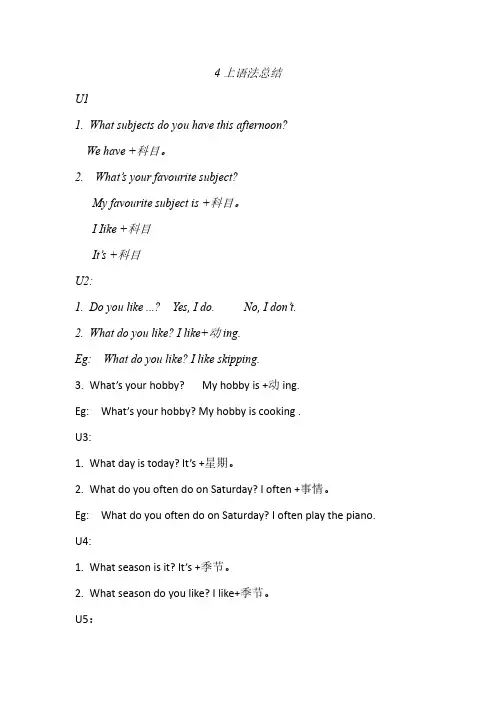
4上语法总结U11.What subjects do you have this afternoon?We have+科目。
2.What’s your favourite subject?My favourite subject is+科目。
I Iike+科目It’s+科目U2:1.Do you like...?Yes,I do.No,I don’t.2.What do you like?I like+动ing.Eg:What do you like?I like skipping.3.What’s your hobby?My hobby is+动ing.Eg:What’s your hobby?My hobby is cooking.U3:1.What day is today?It’s+星期。
2.What do you often do on Saturday?I often+事情。
Eg:What do you often do on Saturday?I often play the piano. U4:1.What season is it?It’s+季节。
2.What season do you like?I like+季节。
U5:1.How’s the weather today?It’s+天气It’s sunny/windy/cloudy.It’s snowing/raining.2.How’s the weather tomorrow?It will/will be+天气It will be sunny/windy/cloudy.It will rain/snow.3.Shall we go to the library?OK!U6:1.Is that your father?Yes.No.2.What does your mother do?She’s an art teacher.3.What does you father do?He’s a businessman.U7:1.May I speak to Jenny?Hold on,please.2.Let’s do some training tomorrow.OK!3.May I have a look?OK!4.What are you doing?I’m writing an email to Tom.5.What’s he doing?He’s doing the high jump.6.What’s she doing?She’s doing the long jump.7.Can he see the pictures?Yes,he can.No,he can’t.。
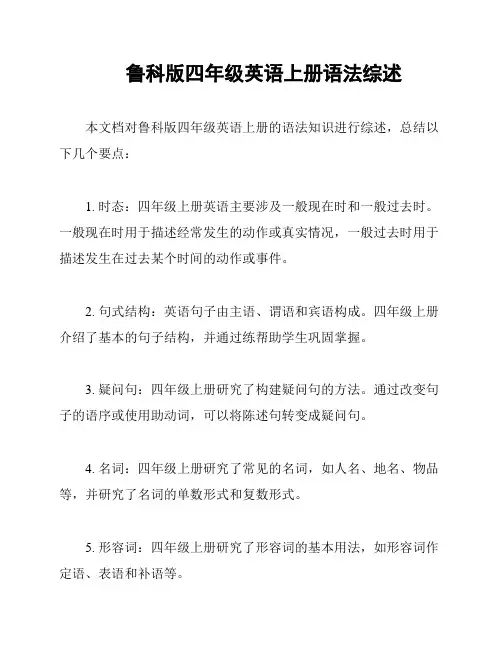
鲁科版四年级英语上册语法综述
本文档对鲁科版四年级英语上册的语法知识进行综述,总结以下几个要点:
1. 时态:四年级上册英语主要涉及一般现在时和一般过去时。
一般现在时用于描述经常发生的动作或真实情况,一般过去时用于描述发生在过去某个时间的动作或事件。
2. 句式结构:英语句子由主语、谓语和宾语构成。
四年级上册介绍了基本的句子结构,并通过练帮助学生巩固掌握。
3. 疑问句:四年级上册研究了构建疑问句的方法。
通过改变句子的语序或使用助动词,可以将陈述句转变成疑问句。
4. 名词:四年级上册研究了常见的名词,如人名、地名、物品等,并研究了名词的单数形式和复数形式。
5. 形容词:四年级上册研究了形容词的基本用法,如形容词作定语、表语和补语等。
6. 副词:四年级上册介绍了一些常用的副词,如时间副词、地
点副词和程度副词等。
学生需要通过练掌握副词的正确用法。
7. 冠词:四年级上册研究了冠词的基本用法,如不定冠词a/an
和定冠词the的使用。
8. 代词:四年级上册介绍了一些常用的代词,如人称代词和物
主代词,并研究了它们在句子中的作用。
9. 介词:四年级上册研究了一些常见的介词,如in、on、at等,并研究了介词与名词、动词等的搭配。
10. 动词:四年级上册介绍了一些常用的动词,如be动词和行
为动词,并研究了它们的用法和变化形式。
以上是对鲁科版四年级英语上册语法知识的综述。
学生们需要
通过课堂学习和大量的练习来巩固掌握这些知识点,以提高自己的
英语语法水平。
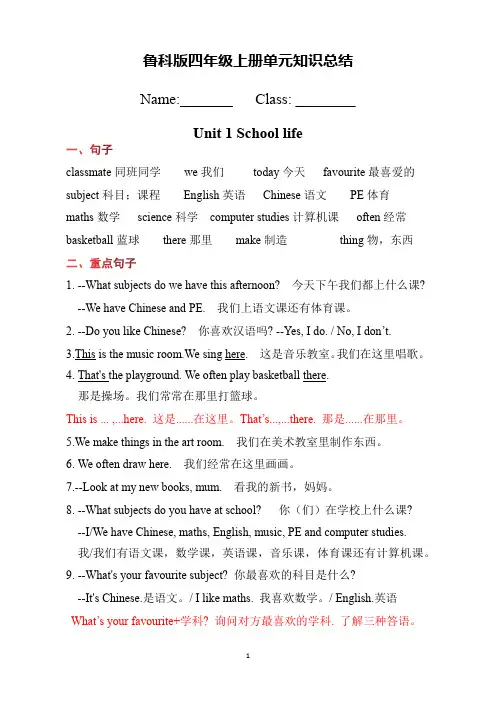
鲁科版四年级上册单元知识总结Name:_______ Class: ________Unit 1 School lifeclassmate同班同学we我们today今天favourite最喜爱的subject科目;课程English英语Chinese语文PE体育maths数学science科学computer studies计算机课often经常basketball蓝球there那里make制造thing物,东西1. --What subjects do we have this afternoon? 今天下午我们都上什么课? --We have Chinese and PE. 我们上语文课还有体育课。
2. --Do you like Chinese? 你喜欢汉语吗? --Yes,I do. / No, I don’t.3.This is the music room.We sing here. 这是音乐教室。
我们在这里唱歌。
4.That's the playground. We often play basketball there.那是操场。
我们常常在那里打篮球。
This is ... ,...here. 这是......在这里。
That’s...,...there. 那是......在那里。
5.We make things in the art room. 我们在美术教室里制作东西。
6.We often draw here. 我们经常在这里画画。
7.--Look at my new books,mum. 看我的新书,妈妈。
8. --What subjects do you have at school? 你(们)在学校上什么课?--I/We have Chinese,maths,English,music,PE and computer studies.我/我们有语文课,数学课,英语课,音乐课,体育课还有计算机课。
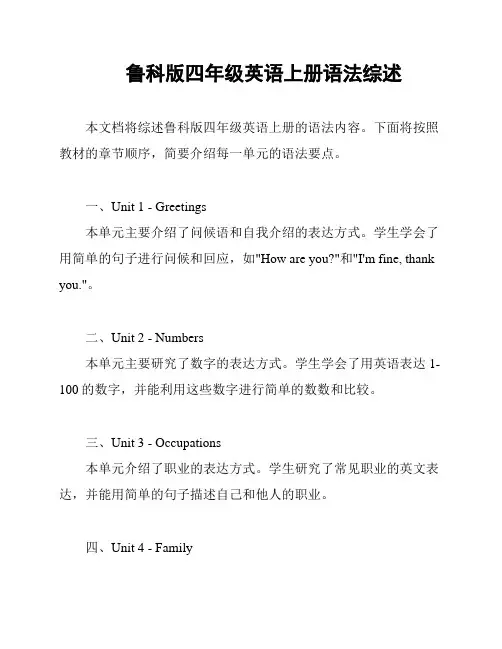
鲁科版四年级英语上册语法综述本文档将综述鲁科版四年级英语上册的语法内容。
下面将按照教材的章节顺序,简要介绍每一单元的语法要点。
一、Unit 1 - Greetings本单元主要介绍了问候语和自我介绍的表达方式。
学生学会了用简单的句子进行问候和回应,如"How are you?"和"I'm fine, thank you."。
二、Unit 2 - Numbers本单元主要研究了数字的表达方式。
学生学会了用英语表达1-100的数字,并能利用这些数字进行简单的数数和比较。
三、Unit 3 - Occupations本单元介绍了职业的表达方式。
学生研究了常见职业的英文表达,并能用简单的句子描述自己和他人的职业。
四、Unit 4 - Family本单元研究了家庭成员的称呼以及他们之间的关系。
学生学会了用英语称呼父母、兄弟姐妹等家庭成员,并能简单地介绍自己的家庭。
五、Unit 5 - Daily Routines本单元研究了日常活动的表达方式。
学生学会了用英语描述自己和他人的日常活动,如起床、吃早饭、上学等。
六、Unit 6 - Food本单元主要研究了食物的表达方式。
学生学会了用英语表达常见食物的名称,并能用简单的句子描述自己喜欢或不喜欢的食物。
七、Unit 7 - Weather本单元介绍了天气的表达方式。
学生研究了描述不同天气情况的英文表达,如"It's sunny."和"It's rainy."。
八、Unit 8 - Colors本单元研究了颜色的表达方式。
学生学会了用英语表达常见颜色的名称,并能用简单的句子描述颜色。
以上是鲁科版四年级英语上册的语法综述。
通过学习这些语法要点,学生能够初步掌握基本的问候、数字、职业、家庭、日常活动、食物、天气和颜色的表达方式。
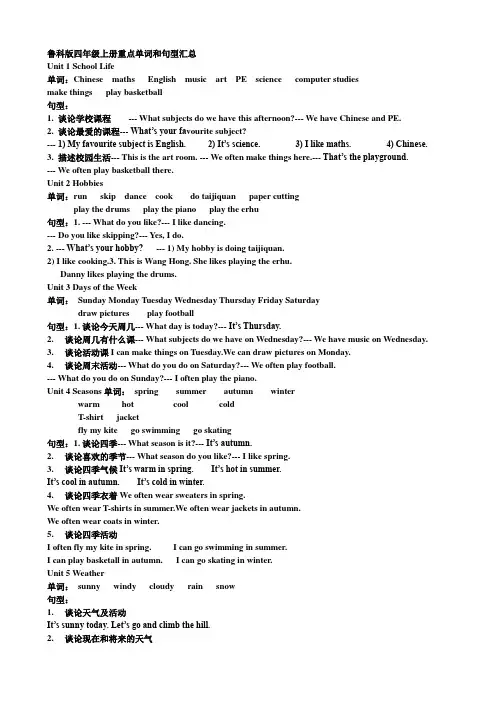
鲁科版四年级上册重点单词和句型汇总Unit 1 School Life单词:Chinese maths English music art PE science computer studiesmake things play basketball句型:1. 谈论学校课程--- What subjects do we have this afternoon?--- We have Chinese and PE.2. 谈论最爱的课程--- What’s your fa vourite subject?--- 1) My favourite subject is English. 2) It’s science. 3) I like maths. 4) Chinese.3. 描述校园生活--- This is the art room. --- We often make things here.--- That’s the playground.--- We often play basketball there.Unit 2 Hobbies单词:run skip dance cook do taijiquan paper cuttingplay the drums play the piano play the erhu句型:1. --- What do you like?--- I like dancing.--- Do you like skipping?--- Yes, I do.2. --- What’s your hobby? --- 1) My hobby is doing taijiquan.2) I like cooking.3. This is Wang Hong. She likes playing the erhu.Danny likes playing the drums.Unit 3 Days of the Week单词:Sunday Monday Tuesday Wednesday Thursday Friday Saturdaydraw pictures play football句型:1. 谈论今天周几--- What day is today?--- It’s Thursday.2. 谈论周几有什么课--- What subjects do we have on Wednesday?--- We have music on Wednesday.3. 谈论活动课I can make things on Tuesday.We can draw pictures on Monday.4. 谈论周末活动--- What do you do on Saturday?--- We often play football.--- What do you do on Sunday?--- I often play the piano.Unit 4 Seasons单词:spring summer autumn winterwarm hot cool coldT-shirt jacketfly my kite go swimming go skating句型:1. 谈论四季--- What season is it?--- It’s autumn.2. 谈论喜欢的季节--- What season do you like?--- I like spring.3. 谈论四季气候It’s warm in spring. It’s hot in summer.It’s cool in autumn. It’s cold in winter.4. 谈论四季衣着We often wear sweaters in spring.We often wear T-shirts in summer.We often wear jackets in autumn.We often wear coats in winter.5. 谈论四季活动I often fly my kite in spring. I can go swimming in summer.I can play basketall in autumn. I can go skating in winter.Unit 5 Weather单词:sunny windy cloudy rain snow句型:1. 谈论天气及活动It’s sunny today. Let’s go and climb the hill.2. 谈论现在和将来的天气1) 谈论今天的天气--- How’s the weather today?--- It’s cloudy.2) 谈论明天的天气--- How’s the weather tomorrow?--- It will be cloudy.3. 谈论某个城市的天气It’s raining in Shanghai. It’s windy in Sanya.--- How’s the weather in Harbin tomorrow?--- It will snow.4. 预报天气It will rain in Hong Kong.It will be sunny in Shenyang.Unit 6 Family单词:tall short strong long hair short hairbusinessman nurse policeman gardenerhospital park句型:1. 谈论家人外貌My father is tall and strong. He has short hair.My mother has long hair and big eyes.2. 谈论家人职业--- What does your mother do?--- She’s an art teacher.--- What does your father do?--- He’s a businessman.3. 谈论家人工作地点My mother works in a hospital.My grandpa works in a park.Unit 7 Communications单词:call speak write(write an email)jump---long jump high jump句型:1. 电话用语--- This is Jenny speaking. May I speak to Li Ming?--- This is Li Ming speaking.--- Shall we go to the library t omorrow? / Let’s go to the library tomorrow.--- OK. / Sorry.2. 谈论正在做的事情--- What are you doing?--- I’m writing an email.--- What’s Wang Hong doing? --- She’s doing the long jump.Danny is doing the high jump.易混词汇here(这里) there(那里) three(3)Tuesday(周二) Thursday(周四)tall(高的) call(打电话)put on(穿上) come on(赶快) hold on(稍等;别挂电话)well(好,令人满意地) will(将会) hill(小山)warm(温暖的) wear(穿)多词性词汇以下4个单词既可作名词,又可作动词rain(雨;下雨)snow(雪;下雪)work(作品;工作)cook(厨师;做饭)。
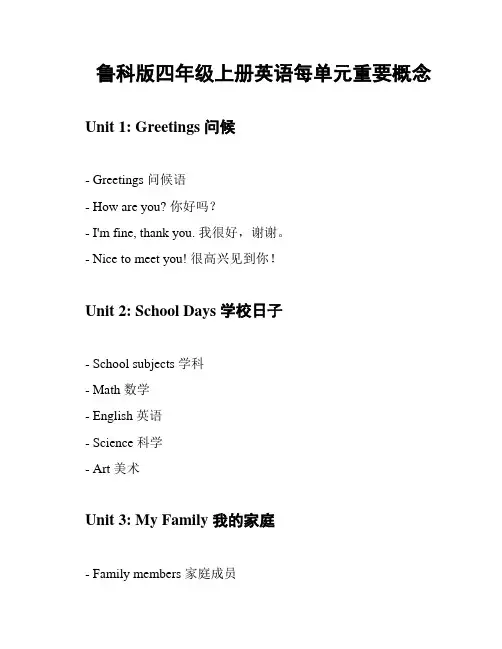
鲁科版四年级上册英语每单元重要概念Unit 1: Greetings 问候- Greetings 问候语- How are you? 你好吗?- I'm fine, thank you. 我很好,谢谢。
- Nice to meet you! 很高兴见到你!Unit 2: School Days 学校日子- School subjects 学科- Math 数学- English 英语- Science 科学- Art 美术Unit 3: My Family 我的家庭- Family members 家庭成员- Father 爸爸- Mother 妈妈- Brother 兄弟- Sister 姐妹Unit 4: My Daily Routine 我的日常生活- Daily activities 日常活动- Wake up 起床- Have breakfast 吃早饭- Go to school 去学校- Do homework 做作业Unit 5: Food and Drinks 食物和饮料- Food 食物- Rice 米饭- Noodles 面条- Fruit 水果- Vegetables 蔬菜Unit 6: At the Park 在公园- Park activities 公园活动- Swing 秋千- Slide 滑梯- Play ball 打球- Ride a bike 骑自行车Unit 7: Weather 天气- Weather conditions 天气状况- Sunny 晴天- Cloudy 多云- Rainy 下雨- Windy 刮风Unit 8: Our Pets 我们的宠物- Pets 宠物- Cat 猫- Dog 狗- Fish 鱼- Bird 鸟Unit 9: Festivals and Holidays 节日和假日- Festivals 节日- Chinese New Year 中国新年- Christmas 圣诞节- Easter 复活节- Halloween 万圣节Unit 10: Colors and Shapes 颜色和形状- Colors 颜色- Red 红色- Blue 蓝色- Yellow 黄色- Green 绿色Unit 11: My Body 我的身体- Body parts 身体部位- Head 头- Eyes 眼睛- Nose 鼻子- Mouth 嘴巴Unit 12: My Home 我的家- Rooms in a home 家中的房间- Living room 客厅- Bedroom 卧室- Kitchen 厨房- Bathroom 浴室Unit 13: Occupations 职业- Jobs 职业- Teacher 老师- Doctor 医生- Pilot 飞行员- Engineer 工程师Unit 14: Modes of Transportation 交通方式- Vehicles 交通工具- Car 汽车- Bus 公交车- Bicycle 自行车- Train 火车Unit 15: Countries and Nationalities 国家和国籍- Countries 国家- China 中国- USA 美国- UK 英国- Australia 澳大利亚Unit 16: Seasons 季节- Seasons 季节- Spring 春天- Summer 夏天- Autumn 秋天- Winter 冬天Unit 17: Time 时间- Time phrases 时间短语- What time is it? 现在几点了?- It's three o'clock. 现在三点。
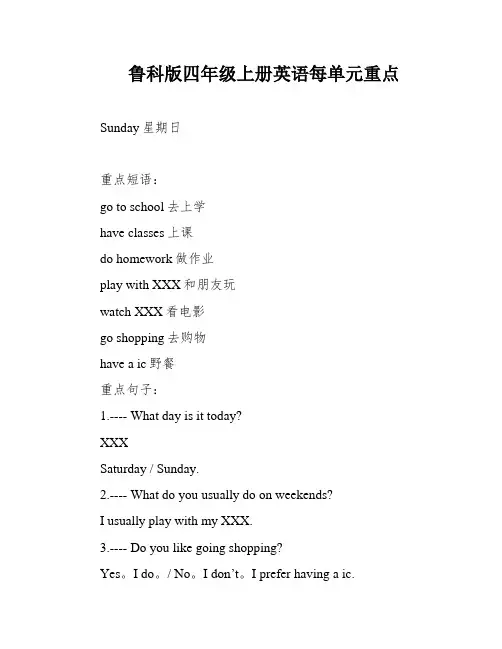
鲁科版四年级上册英语每单元重点Sunday星期日重点短语:go to school去上学have classes上课do homework做作业play with XXX和朋友玩watch XXX看电影go shopping去购物have a ic野餐重点句子:1.---- What day is it today?XXXSaturday / Sunday.2.---- What do you usually do on weekends?I usually play with my XXX.3.---- Do you like going shopping?Yes。
I do。
/ No。
I don’t。
I prefer having a ic.Sunday:常用搭配短语:踢足球:play football打篮球:play basketball弹钢琴:play XXX拉二胡:play XXX画画:draw pictures打太极拳:do XXX在星期三:on XXX重点句子:1.——今天是星期几?今天是星期四。
2.我可以在星期二画画。
我们可以在星期三踢足球。
3.——你周六做什么?我经常打篮球。
我们经常拉二胡。
第四单元重点:词汇分类:1)季节单词:春天:spring夏天:summer 秋天:XXX冬天:winter2)天气单词:温暖的:warm 热的:hot凉爽的:cool 寒冷的:XXX3)衣着单词:T恤衫:T-shirt 夹克衫:jacket 毛衣:sweater 外套:coat帽子:cap4)表示动作的单词:穿、戴:wear飞、飞行;放(风筝等):fly游泳:swim溜冰、滑冰:skate惯搭配短语:放风筝:XXX游泳:go swimming滑冰:go skating穿毛衣:wear sweaters去滑冰:go skating什么季节:what XXX在一年里:in a year在春季/夏季/秋季/冬季:in spring/summer/autumn/winter 怎么样:what about(征求意见或询问消息时用)重点句子:1.——现在是什么季节?现在是秋天。
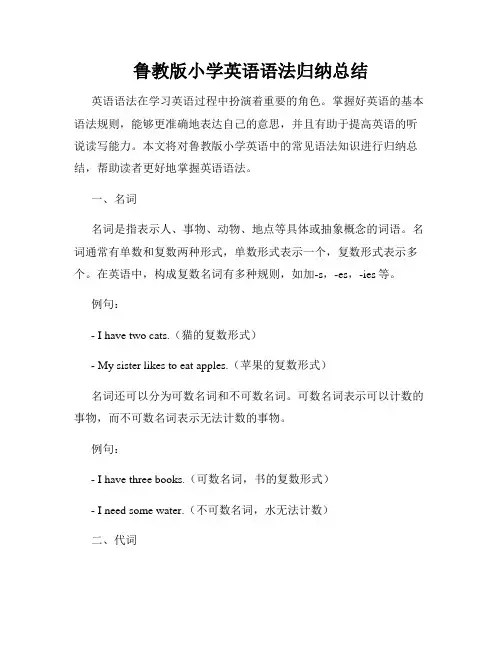
鲁教版小学英语语法归纳总结英语语法在学习英语过程中扮演着重要的角色。
掌握好英语的基本语法规则,能够更准确地表达自己的意思,并且有助于提高英语的听说读写能力。
本文将对鲁教版小学英语中的常见语法知识进行归纳总结,帮助读者更好地掌握英语语法。
一、名词名词是指表示人、事物、动物、地点等具体或抽象概念的词语。
名词通常有单数和复数两种形式,单数形式表示一个,复数形式表示多个。
在英语中,构成复数名词有多种规则,如加-s,-es,-ies等。
例句:- I have two cats.(猫的复数形式)- My sister likes to eat apples.(苹果的复数形式)名词还可以分为可数名词和不可数名词。
可数名词表示可以计数的事物,而不可数名词表示无法计数的事物。
例句:- I have three books.(可数名词,书的复数形式)- I need some water.(不可数名词,水无法计数)二、代词代词是用来替代名词在句子中的一种词语。
常见的代词有人称代词、物主代词、反身代词等。
人称代词分为主格和宾格两种形式。
主格代词用于句子的主语位置,宾格代词用于句子的宾语位置。
例句:- She is my friend.(她是我的朋友,主格代词)- I like her.(我喜欢她,宾格代词)物主代词用来表示所属关系,常见的物主代词有my、your、his、her等。
例句:- This is my book.(这是我的书)反身代词表示动作的主体同时也是动作的承受者。
例句:- I hurt myself.(我伤害了自己)三、动词动词是表示动作、状态或存在的词语。
在英语中,动词的形式会随着句子的主语的人称和数的变化而变化。
例句:- He reads books.(读的第三人称单数形式)- They play soccer.(玩的第三人称复数形式)动词还有时态的变化,常见的时态有一般现在时、一般过去时和一般将来时。
Unit 1 School Life1. —What subjects do we have this afternoon?—We have Chinese and PE.问句结构:What subjects do/does + 主语+ have + 时间状语?答语结构:主语+ have/has + 表示科目的名词.这是一个由“what + 名词”引导的特殊疑问句,用来询问和表达科目的安排。
助动词do/does以及实意动词have/has的选择根据主语的不同而定。
常用的时间状语有this morning/afternoon、in the morning/afternoon等。
例如:—What subject do you have this afternoon? 今天下午你们有什么课?—We have art. 我们有艺术课。
2. —What’s your favourite subject? 你最喜欢的科目是什么?—It’s science.(它是)科学。
“What’s your favourite ...?”这个句型常用来提问对方最喜欢的颜色/科目是什么。
回答可以用“It’s...”或“My favourite ... is ...”,也可以直接回答所喜欢的事物名词。
例如:—What’s your favourite colour? 你最喜欢的颜色是什么?—My favourite colour is red./It’s red./Red. 我最喜欢的颜色是红色。
/它是红色。
/红色。
3. We often draw here. 我们经常在这里画画。
这是一个主谓结构的简单句。
draw在这里作不及物动词。
英语中的基本句型有五种,我们先介绍三种最基本的句型:(1)主语+ 不及物动词例如:She sings (here). 她在这里唱歌。
(2)主语+ 及物动词+ 宾语例如:I like apples. 我喜欢苹果。
一、四线三格单词以及相关单词一单元art 美术music 音乐English 英语Chinese 语文science 科学maths数学computer studies 信息技术PE 体育二单元run 跑sing 唱歌cook 做饭dance 跳舞read 读skip 跳绳三单元football足球picture 图画draw 画画play 玩basketball 篮球四单元spring 春summer 夏autumn 秋winter 冬season 季节五单元sunny 阳光灿烂snow雪rain雨windy刮风的cloudy 多云weather 天气六单元teacher 教师farmer 农民nurse护士doctor 医生businessman商人policeman 警察七单元play basketball 打篮球read a book 读书write an email 写电子邮件make things 做手工paper cutting 剪纸fly my kite 放风筝Climb the hill 爬山play the piano 弹钢琴play the drums 打鼓doing the long jump 跳远doing the high jump 调高二、句法归类1、What do you do on Saturday ? I often play the drums.2、What subjects do we have on Thursday ?We have maths and music.3、What day is today ? It's Tuesday .4、What season is it ? It's spring.5、What's your hobby ? My hobby is dancing .I like cooking.6、What does your father do ? He's a businessman.7、What's your favorite subject ? It's English. I like science.8、How 's the weather today ? It's raining . It's cold.9、How 's the weather in Qing Dao tomorrow ? It will snow .It will be sunny.10、It will be windy in Hai nan. It will rain in Shanghai.三、单元重点句型一单元、1、We make things in the art room. We draw pictures in the art room. we sing in the music room.we play basketball on the playground .2.、What subjects do we have this morning ?We have Chinese maths and PE3、What's your favorite subject ? It's English. I like science.二单元1、What’s your hobby ? 两种答法I like skipping . My hobby is reading.My hobby is paper cutting. .My hobby is playing the piano.What’s your mother’s hobby ? She likes cooking .2、He likes playing the piano. She likes dancing . He plays well.My hobby is paper cutting.3、Danny likes playing the drums. Peter likes singing.三单元can 后面用动词原形。
鲁科版四年级英语上册语法总结1. 介词- 介词用来描述事物之间的位置关系或表示方式、原因等。
- 常见的介词有:in, on, at, under, above, by, with等。
2. 名词复数形式- 一般情况下,名词的复数形式在词尾加-s。
- 以s, x, ch, sh结尾的名词,复数形式在词尾加-es。
3. 动词过去式- 一般情况下,动词的过去式在词尾加-ed。
- 以e结尾的动词,过去式只需加-d。
- 以辅音字母+y结尾的动词,去掉y变为i,再加-ed。
4. 形容词的比较级与最高级- 一般情况下,形容词的比较级在词尾加-er,最高级在词尾加-est。
- 以e结尾的形容词,比较级和最高级只需加-r和-st。
- 以辅音字母+y结尾的形容词,去掉y变为i,再加-er和-est。
5. 人称代词- 人称代词用来代替人或事物的名称。
- 常见的人称代词有:I, you, he, she, it, we, they等。
6. 不定代词- 不定代词用来代替不特定的人或事物。
- 常见的不定代词有:some, any, no, every, all, both, few, many 等。
7. 祈使句- 祈使句用来表示请求、命令、建议等。
- 祈使句的主语是you,动词用原形,句末常用句号或感叹号。
8. 现在进行时- 现在进行时用来表示现在正在进行的动作。
- 句子结构:主语 + am/is/are + 动词-ing。
9. 一般现在时- 一般现在时用来表示客观事实、经常性的行为或状态。
- 句子结构:主语 + 动词原形。
10. 时间表达- 表达几点钟的时间,用数字+o'clock。
- 表达几点几分的时间,用数字+点+数字。
以上是鲁科版四年级英语上册的语法总结,希望对你有帮助。
鲁科版四年级英语上册语法整理一、名词1. 名词是用来表示人、事物、地点、动物等的名称的词语。
2. 名词分为可数名词和不可数名词两种。
- 可数名词是可以用来计数的,如:book(书),dog(狗)。
- 不可数名词是不能用来计数的,如:milk(牛奶),water (水)。
二、动词1. 动词是表示动作、状态或存在的词语。
2. 动词分为及物动词和不及物动词两种。
- 及物动词是需要宾语来补充意义的动词,如:eat(吃),write(写)。
- 不及物动词是不需要宾语来补充意义的动词,如:run(跑),sleep(睡觉)。
三、形容词1. 形容词是用来描述名词性质或状态的词语。
2. 形容词在英语中有三个等级:原级、比较级和最高级。
- 原级是形容词的最原始形式,如:big(大),strong(强壮)。
- 比较级是形容词表示稍微超过或不如原级的程度,如:bigger (更大),stronger(更强壮)。
- 最高级是形容词表示在同类中最高程度的程度,如:biggest (最大的),strongest(最强壮的)。
四、副词1. 副词是用来修饰动词、形容词、副词等的词语。
2. 副词的作用是表示程度、时间、地点等。
- 表示程度的副词有:very(非常),quite(相当)。
- 表示时间的副词有:today(今天),tomorrow(明天)。
- 表示地点的副词有:here(这里),there(那里)。
五、句子1. 句子是由主语和谓语构成的完整意义的表达方式。
2. 句子可以分为陈述句、疑问句和祈使句等。
- 陈述句是陈述一个事实或描述一个情况的句子,一般以句号结尾。
- 疑问句是用来提问的句子,一般以问号结尾。
- 祈使句是表示命令、请求或建议的句子,一般以句号或感叹号结尾。
以上是对鲁科版四年级英语上册的语法整理的简要介绍。
学生们可以通过掌握这些语法知识,提高英语的学习效果。
鲁科版四上英语知识点归纳1. 复习基础知识:四上英语课本开始,首先对一些基础知识进行了复习。
比如,名词的复数形式、动词的过去式和现在分词形式等。
这些知识点是之后学习更复杂的语法和句型的基础。
2. 时态及动词用法:该学期的课程重点介绍了一些常用的时态,如一般现在时、一般过去时、现在进行时等。
同时,还学习了一些常用的动词用法,如及物动词和不及物动词的区别,以及动词的时态和人称的变化规则。
3. 简单的日常用语:四上英语课本中的对话和练习题都着重强调了日常生活中常用的英语表达。
学生可以通过课本中的情景对话来学习如何询问和回答关于时间、日期、年龄、兴趣爱好等方面的问题。
4. 数字和计量单位:课本中也介绍了一些基本的数字和计量单位。
学生需要学会如何用英语表达数字、日期、电话号码等,并掌握一些常见的计量单位,如长度、重量、时间等。
5. 基本的语法知识:课本中涵盖了一些基本的语法知识,如名词所有格、形容词的比较级和最高级等。
这些知识点对于学生的语言表达能力和语法运用能力的提升非常重要。
6. 阅读理解和写作技巧:四上英语课本中也包含了一些阅读理解和写作练习。
通过阅读课文和其他材料,学生可以提高自己的阅读能力和理解能力,同时也可以锻炼自己的写作技巧。
7. 口语练习和听力训练:在四上英语课本中,还有一些口语练习和听力训练的内容。
学生需要通过和同学的对话练习来提高口语表达能力,并通过听力训练来提高自己的听力理解能力。
鲁科版四上英语主要围绕基础知识的复习、时态及动词用法、简单的日常用语、数字和计量单位、基本的语法知识、阅读理解和写作技巧以及口语练习和听力训练展开。
这些知识点和技能的学习将帮助学生打下坚实的英语基础,为之后更深入地学习英语打下基础。
四年级英语上册语法总结
一、固定搭配及用法 1. 喜欢做某事:like + 动词ing形式I like dancing.
2. My hobby is + 动词ing形式My hobby is dancing.
(以上2种情形必须使用动词ing形式,请牢记;注意对比区分现在进行时)
3. on + 星期几I can draw pictures on Thursday.
4. in + 季节It’s warm in spring.
in + 城市名称It’s raining in Shanghai.
5. play的用法1) play 直接加球类play football play basketball play ping-pong
2) play + the + 乐器play the drums play the erhu play the pipa
6. will + 动词原形It will rain in Hong Kong. It will snow in Ningyang.
will + be + 形容词It will be sunny tomorrow. It will be windy in Shenyang.
7. 情态动词(will, can, shall, may) + 动词原形
will + 动词原形It will snow in Ningyang. can + 动词原形I can dance on Monday. shall + 动词原形Shall we go to the park? may + 动词原形May I have a look?
8. 描述人物时is 和has 的不同用法My brother is short. He has short hair and big eyes.
9. an an art teacher an English teacher an email
10. 名词所有格: …’s,表示:…的What’s Xiaobai’s hobby?That’s Liu Lei’s father.
11. 首字母大写Sunday-----Saturday(星期几词汇) Chinese English T-shirt
Danny Guo Y ang Beijing Kunming(人名地名)
二、动词的第三人称单数 1. 适用范围---主语是he, she, 人名,my sister/your father
2. 变化规则1) 规则变化直接+s Danny likes playing the drums.
He plays well. My grandpa works in a park.
2) 不规则变化have --- has I have big eyes. He has small eyes.
do --- does What does your mother do?
三、现在进行时1. 含义:表示正在进行的动作或存在的状态。
2. 基本结构:主语+ be动词(am, is, are) + 动词ing形式
It’s snowing in Harbin. It’s raining in Shanghai.---What are you doing?
---I’m writing an email.---What’s Danny doing? ---He’s doing the high jump.
3. 动词ing形式的变化规律1) 一般情况下直接+ing 2) 去掉不发音的字母e+ing dance---dancing skate---skating make---making come---coming write---writing
3) 双写末尾字母+ing run---running swim---swimming skip---skipping
四、一般疑问句1.汉语意思为“…吗?”2. 2种回答:肯定回答(Yes)和否定回答(No)--- Do you like running? --- Yes, I do. / No, I don’t.--- Can he see the pictures? ---Yes, he can. / No, he can’t.
(注意人称应符合逻辑或保持一致;注意划线部分必须一致)3. 读时使用升调
4.含有情态动词的一般疑问句---Shall we go to the library? ---OK. ---- Sorry
---May I have a look? --- Sure.。